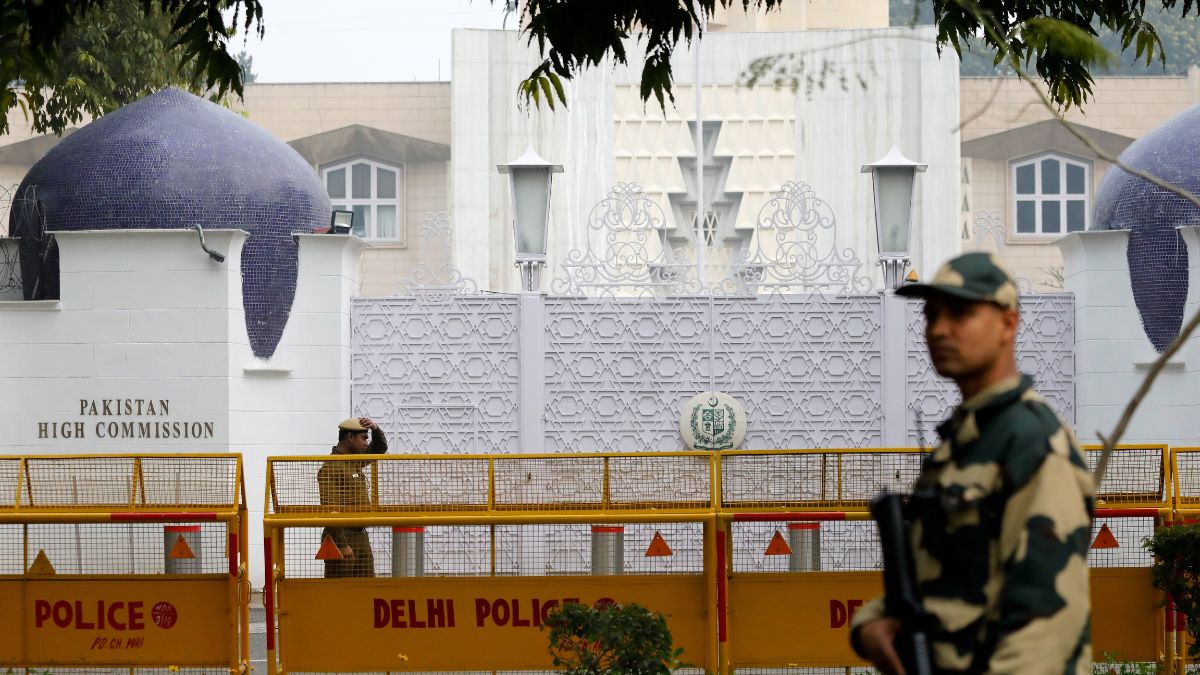India has expelled a staff member of the Pakistan High Commission in New Delhi after uncovering their involvement in an alleged espionage operation.
On Tuesday (May 13, 2025), the Ministry of External Affairs (MEA) issued a formal notice to the Charge d’Affaires of Pakistan in New Delhi, conveying that a Pakistani official had been declared persona non grata and would be required to depart the country within 24 hours.
The expulsion was made in response to findings linking the staffer — identified as “Danish” — to activities inconsistent with diplomatic norms, particularly in connection with an intelligence breach in Punjab.
“The Government of India has declared a Pakistani official, working at the Pakistan High Commission in New Delhi, persona non grata for indulging in activities not in keeping with his official status in India. The official has been asked to leave India within 24 hours. Charge d’ Affaires, Pakistan High Commission, was issued a demarche to this effect today,” stated the MEA.
According to Indian intelligence sources, Danish is believed to be affiliated with Pakistan’s Inter-Services Intelligence (ISI). His alleged activities include coordinating with Indian nationals to gather classified information on Indian military movements.
What is behind the Pak diplomat’s expulsion
The decision to expel Danish follows the arrest of two Indian citizens by Punjab Police in what authorities have described as a cross-border espionage ring.
The individuals, identified as Guzala and Yameen Mohammed, were detained based on credible intelligence and are currently under investigation for allegedly leaking military information to a Pakistan-based handler.
According to The Print, Guzala reportedly came into contact with Danish during a visit to the Pakistan High Commission in February 2025, where she had gone to submit a visa application.
The two are said to have maintained regular communication through encrypted messaging applications after that initial meeting.
Punjab Director General of Police (DGP) Gaurav Yadav confirmed that the arrests were made following actionable inputs: “Acting on credible intelligence, one suspect was arrested for leaking sensitive information to a Pakistan-based handler regarding Indian Army movements.”
The investigation has revealed that Guzala allegedly received ₹30,000 in exchange for sharing restricted data.
The money was reportedly transferred to her in two digital payments via the Unified Payments Interface (UPI), with an initial payment of ₹10,000 followed by a subsequent transaction of ₹20,000, reported The Print.
These transfers were allegedly arranged through Yameen Mohammed, who is considered the key organiser of the espionage operation.
Police officials indicated that Guzala and Danish met once again in April, during which she is suspected to have physically handed over classified information.
Following her interrogation, Yameen was apprehended and found to have travelled to Pakistan in 2018 and again in 2022, raising further concerns about long-term links to Pakistani intelligence services.
The First Information Report (FIR) related to this case was officially registered on May 8, one day after the Indian government launched a major cross-border counter-terrorism mission.
In tit-for-tat move, Pakistan expels Indian diplomat
In the wake of the Indian decision to expel the Pakistani official, Islamabad quickly responded in kind.
Pakistan’s Ministry of Foreign Affairs summoned the Indian Charge d’Affaires in Islamabad and issued a demarche, informing them that a staff member of the Indian High Commission had also been declared persona non grata. The official was directed to leave Pakistani territory within 24 hours.
In a statement posted to X (formerly Twitter), Pakistan’s foreign office said: “… The government of Pakistan has declared a staff member of the Indian High Commission, Islamabad, as persona non grata for engaging in activities incompatible with his privileged status. The concerned official has been directed to leave Pakistan within 24 hours.”
“The Indian Charge d’Affaires was called to the Ministry of Foreign Affairs today for demarche, conveying the decision,” the post continued.
🔊PR NO.1️⃣3️⃣7️⃣/2️⃣0️⃣2️⃣5️⃣
— Ministry of Foreign Affairs - Pakistan (@ForeignOfficePk) May 13, 2025
A Staff Member of the Indian High Commission, Islamabad, Declared as Persona Non Grata
The Government of Pakistan has declared a staff member of the Indian High Commission, Islamabad, as persona non grata for engaging in activities incompatible with his…
This form of diplomatic expulsion — based on the Latin term persona non grata, meaning “an unwelcome person” — is a standard international practice employed when a foreign diplomat is believed to have violated the norms of conduct expected under diplomatic protocols.
This week’s exchange of expulsions is the first such diplomatic confrontation since the military clashes in the last few days.
It also follows a precedent: On April 23, following the Pahalgam attack, India summoned Pakistan’s senior diplomat Saad Ahmad Warraich and handed over a formal notification declaring several military officials at the Pakistani High Commission in New Delhi as persona non grata.
Pakistan had then responded by expelling India’s top military attaches posted in Islamabad.
Operation Sindoor and its aftermath
In retaliation to the April 22 Pahalgam terrorist attack, the Indian Armed Forces launched Operation Sindoor , targeting nine terrorist facilities situated in both Pakistan and Pakistan-occupied Kashmir (PoK).
The operation reportedly struck locations affiliated with several internationally proscribed organisations, including Lashkar-e-Taiba (LeT), Jaish-e-Mohammed (JeM) and Hizbul Mujahideen (HM).
Notable among the sites targeted were Bahawalpur, JeM’s headquarters; Muridke, a stronghold of LeT; and Muzaffarabad in PoK.
Following these strikes, Pakistan retaliated by launching multiple air and ground attacks between May 7 and May 10. The most significant escalation occurred on May 10, when Pakistan mounted a widespread offensive targeting 26 different Indian military and civilian sites across the Line of Control and the International Boundary.
Indian security forces were able to intercept and neutralise the attacks, limiting both infrastructural damage and personnel casualties.
By Saturday afternoon (May 10, 2025), both countries agreed to a ceasefire effective from 5 pm that day . The truce has since held, bolstered by two rounds of communication since then between the respective Directors General of Military Operations (DGMOs), aimed at de-escalating further military engagement.
With inputs from agencies


)

)
)
)
)
)
)
)
)



